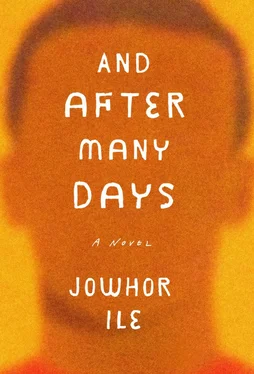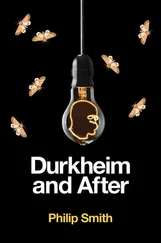On Herbert Macaulay Road, he wants to point out to Paul that the video club has been demolished. He wonders aloud in disgust at why so many shops have been built so close to the road.
There is a huge billboard advertising a mobile phone network, a young man and woman holding phones to their ears and smiling lovingly at each other. Just beyond that is a billboard advertising a church. The pastor, a man in a shiny suit, is smiling with his hands held together on his chest; his wife, a woman in a red skirt suit and a large black hat, is to his right. Farther down the road, there are more billboards, posters stuck on fences, on electric poles and transformers, of preachers with a variety of titles — bishops, apostles, prophets, evangelists, pastors, and reverend pastors — inviting members of the public to different church programs: Night of Encounter, Operation Claim Your Victory, At the Red Sea: Your Enemies Must Drown. They promise a “power-packed” event where the Word would be shared and miracles will manifest. Some note that they will be “ministering, in partnership with the Holy Ghost.” They all promise divine favor, fruit of the womb, increases in business, prosperity, healing, open doors, and freedom from demonic oppression.
A white Jeep pulls up right beside him, and Ajie stops walking. A woman in a blond weave sticks her face out the window to ask if he knows the way to Atako Street. He points in the direction of the street, which is in fact the very next turn. After she drives off, he notices a small banner tied to a transformer, fluttering a little in the breeze, and on it a minister with the title “Field Marshal of the Most High,” inviting the public to a night of answered prayers specifically tagged: Lord Give Me a Spouse Lest I Die.
Ajie follows the road heading back to Nzimiro and wonders about Mrs. Braide, their former neighbor from number 6. She used to go to a church like these. When they were children, Ma and most people they knew viewed those places of worship with suspicion. Now, he thinks, there is such a mania for them. When did this change?
Ma said Mrs. Braide had relocated to Abuja after kidnapping got rife in Port Harcourt in the past couple of years. Armed militants who claimed they were struggling to get a fairer deal for the oil-producing minorities who had been neglected by government began kidnapping European oil workers for ransom.
These days, since the number of European workers has dwindled, just about anyone is up for grabs if you are deemed wealthy enough to cough up some money, or your family or friends are. Local criminals have found a new trade.
Ma told Ajie that sometimes the negotiations for ransom scaled down from millions of naira to hundreds of thousands, then down to tens of thousands, when it became obvious the captive’s family really had no money. A band of kidnappers begged a family to send them mobile phone credit, at least, to cover the captive’s call cost and feeding expenses for the two weeks. Sometimes kidnappers just ceased making contact with the captive’s family even when negotiations were going well, and they would later learn or simply accept after waiting for months that their loved one had died from an illness or been shot by accident. Ma warned Ajie to be careful, not to let people know he had come from abroad, since they might think he was rich, and Ajie just looked at her and wondered how he could be kidnapped from his own streets.
As he turns onto Yakubu Avenue, Ajie spots Ismaila and his friend from a distance. They are now two little black things crouched on their haunches, like professional beggars at Garrison Junction. Are they writing on the sand or what? he wonders.
“Madam done return,” Ismaila says to him.
“Oh. Okay. Thank you, Ismaila.”
Ma is in the kitchen, standing over the sink. “You did not eat your food.” She wipes her hand on a kitchen towel and hangs it back on the peg. She uncovers a ceramic bowl on the gas burner, then puts it back. There is boiled yam in it.
“I will eat later.”
Ma opens the fridge and takes out a bottle of Sprite and hands it to Ajie. “It’s Sprite you like, abi ?” Then, “Oh, sorry, it might ruin your appetite. Except you want it.” She lets him decide, and Ajie says thanks, that he will have the Sprite with his meal.
“Has Bibi confirmed when she’s arriving?”
“Tomorrow.” Ma runs her hand over the top of the fridge for an opener. “First flight.”
“With her boyfriend?”
“Her fiancé.”
“Boyfriend,” Ajie says. “She hasn’t said she wants to marry him.”
“Fiancé,” Ma says firmly, her mouth about to smile.
Ajie is in her way so that she brushes against him as she passes. He goes into the garden and is confronted with Ma’s expanded taste in plants.
Throughout Ajie’s ten-year sojourn abroad, Ma was always a morning caller. Nigeria and Britain were in the same time zone for most of the year, yet each time Ma called, he felt a lapse he could never explain or shake off, like she was speaking from the past, a gaping void with muted echoes.
After he finished boarding school, he left Port Harcourt for St. Albans, an English city which at first felt to him more like a medieval town, with its stone wall, church bells, and oak doors that give onto the narrow cobbled streets. He attended sixth form there and lived as a boarder in the house of a middle-aged widow, Mrs. Heath. Ma would call on the landline by eight in the morning. “Why are you still in bed? I can hear it in your voice. Don’t you have class today?”
He left Hertfordshire, moved to London to study electrical and electronic engineering at Imperial College, and then began to do the Friday-night pub crawls that left him groggy and hungover until two P.M. the next day. He started missing Ma’s calls. Sorry. Call you back in the evening, he would text her. He wouldn’t return her call, and Ma would ring him again on Sunday morning before heading to church.
Why does she never call in the afternoon or when I’m not in bed?
Throughout his years at university, during his one-year internship, and when he began his first proper job working for a digital media company at Kings Cross, Ma would always ring him twice a week: once on the weekend, and again in the middle of the week.
Last week his phone rang, and Ma’s voice came through: “Where are you?”
“I’m at home,” he replied. He almost joked, “Standing in the kitchenette of my flat in the North London borough of Camden, and where are you?” But something in Ma’s voice stopped him. “I’m at home. Are you okay, Ma?”
“I need you to buy a ticket as soon as you can.”
“A ticket.”
“Yes, if possible for tomorrow — you can tell them at work that it’s important. A man has just left here, says he’s a pastor. It’s about your brother, Paul. Can you get a ticket? I have sent for your sister, too.”
“It is not enough to confess your sins and receive forgiveness from God,” the man sitting before Ma began. “Even though the blood of Jesus washes your slate of sins clean, you have to go back to the people you’ve wronged in the past and try to make things right. Some Christians these days believe this is some obsolete Old Testament doctrine, but it’s not. A true believer must make restitutions for his or her wrongs. The Bible shows us ways of doing this; this is not about trying to pay people off, no. If, for instance, you steal something from someone and you one day repent of your sins and God forgives you, shouldn’t you go to the person you stole from, apologize, and then give back what you have stolen?”
Ma waited to see where it was all going. She had been in her back garden, weeding, when Ismaila called out to say she had a visitor. It could have been anyone, relatives always dropped by. Perhaps it was someone from Ogibah who would want to spend the night, or one of Bendic’s former colleagues. Once someone had come in to inquire if she was looking to sell the house, and Ma didn’t know how to respond, so she just said no, as if it weren’t such an unusual question to ask in the first place.
Читать дальше












